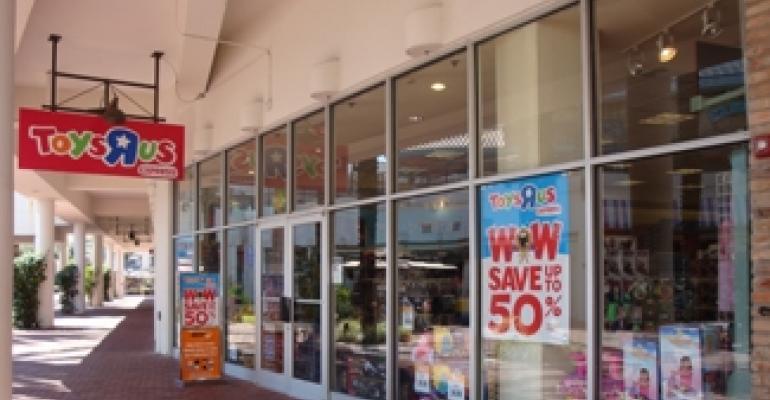
As the 2010 holiday shopping season draws near, retailers have started rolling out ambitious pop-up store campaigns to take advantage of empty mall corners and drive up holiday sales revenue.
In the past few weeks, Toys ‘R’ Us, Borders, Build-a-Bear Workshop and Harry & David, among others, either announced plans to increase the number of pop-up store openings from last year or to foray into pop-ups for the first time. For their part, landlords hope all this pop-up activity will lead to permanent lease deals.
“Given the amount of space in the market today, pop-up leasing really does present a unique opportunity. As landlords, we can give retailers an opportunity to experiment with a new location and a new concept,” says Michael Carroll, president and CEO of Centro U.S., Centro Properties Group’s U.S. division. “And especially in the toy category, if those locations are successful, we are, in fact, incubating a permanent tenant into that space.”
The toy sector will see some of the most ambitious pop-up activity this year. Toys ‘R’ Us plans to open 600 Toys ‘R’ Us Express stores during the fourth quarter of 2010, up from 90 last year. It also plans to open 10 pop-ups for FAO Schwartz, the upscale toy chain it acquired in 2009. Meanwhile, Build-a-Bear Workshop has plans for 10 pop-ups of its own.
In addition, bookseller Borders will open 25 small-format pop-up stores on Oct. 25. The stores, averaging 2,500 square feet, will be located in malls formerly occupied by Borders Express units and will sell e-readers, bestselling physical books and holiday costumes. Meanwhile, Harry & David, the gift seller, will open 16 pop-up stores, called Harry & David Orchards, beginning Oct. 15.

Pop-up leasing is by no means a new phenomenon. Landlords and retailers have been employing it for at least the past 15 years, says Jeff Gregerson, vice president of specialty retail with CBL & Associates Properties Inc., a Chattanooga, Tenn.-based regional mall REIT.
What’s been new in 2010 is the growing number of well-recognized national brands that have expressed interest in pop-ups. So far, CBL has completed more than a dozen deals with Toys ‘R’ Us for its Express stores and is working on pop-up agreements with the Burlington Coat Factory. And the firm has been getting calls from other national chains, including Walmart and Bed, Bath & Beyond, according to Gregerson.
“They are asking questions and looking into possibilities,” Gregerson notes.
Centro’s Carroll estimates that his company signed leases for 48 pop-up stores with 11 retailers for this Halloween season. Halloween has traditionally been the most active time for pop-up leasing, with both seasonal chains and regular players looking to take advantage of fourth quarter holidays. Last year, Centro completed 35 pop-up leases with five retailers during the same period.
Jones Lang LaSalle Retail, an Atlanta-based third party property manager, has also signed more pop-up leases year-to-date in 2010 than it did in 2009, according to John Bemis, executive vice president and director of leasing with the firm. He expects the trend to hold through the end of the year.
Part of the reason for the increase in pop-up activity is a desire to wring the most revenue out of the holiday sales season, landlords say. But in the current environment, many retailers also see a cost-effective opportunity to test new markets or store concepts before investing in permanent locations, says Bemis.
Toys ‘R’ Us, for example, plans to put a number of its Express pop-ups into former KB Toys spaces. If those stores perform during the holidays, the company could end up leasing some on a permanent basis, Bemis notes.
The same could be true for Borders. Most of its stores today provide a deep merchandising mix. But smaller locations could focus on the most popular items.
“That could definitely be an opportunity for a permanent location going forward,” Bemis says. “They can take the top 20 percent of their inventory and put it into a smaller format store where the infrastructure is already in place. I could definitely see that, a kind of back-to-the-future situation.”
Most retailers base the decision on whether to transition a pop-up location into a permanent one on sales volume and shopper traffic at the center. Some, however, use more unconventional methods. For example, Ricky’s NYC, a regional accessories and beauty supplies store, looks at whether the pop-up tends to sell the same volume of certain core products as its regular stores, says Adam Stupak, a broker with New York City-based RIPCO Real Estate Corp., who represents the chain. The level of demand for its most popular products shows Ricky’s team whether the demographic in the neighborhood fits its target—women over 18 years of age.
In 2010, Ricky’s NYC opened 27 pop-up stores and about five of those became permanent locations. This year, the chain plans to open approximately 40 pop-ups.
“If we like the area and it does well for Halloween, we will stay there,” Stupak says.
Retailers have to be careful, however, that pop-up locations offer them an accurate view of how permanent stores would perform, says Eileen Mitchell, executive vice president with RCS Real Estate Advisors, a New York City-based retail real estate consulting firm. Often, pop-up locations are in the far-off corners of malls and may be out of customers’ sights. There are often also issues with branding. Because one of the main attractions of pop-ups is that they cost a lot less than build-outs, the resulting stores often look cheap and turn off potential shoppers.
“It’s the quality of the fixtures, the quality of the signs, the lighting, the flooring,” Mitchell notes. “All the things that you get in a built-out store, you don’t receive in the pop-ups. It makes the merchandise look less [high] quality as well. I think pop-ups work if you are doing them to increase the revenue at holiday time, but not to test for permanent locations, because [often] you are not comparing apples to apples.”

